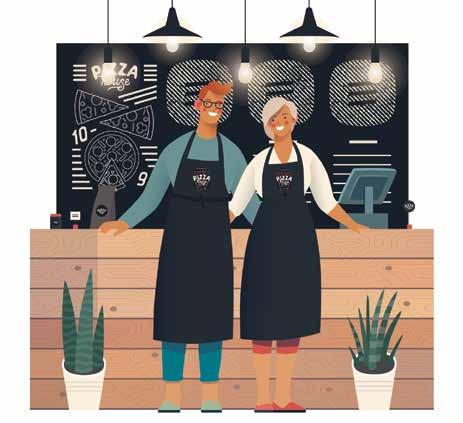
42 minute read
GUEST
The Truth About Family Businesses
A local business coach separates fact from fiction and offers advice to help things run smoother.
BY MATT HAHNE
FAMILY BUSINESSES ARE THE LIFEBLOOD
of south Louisiana and the United States — 90% of businesses in this country are family-run or family-owned. Family businesses provide more than 60% of the nation’s employment and over half of the GDP.
The math is simple: If you want to grow a stronger economy, do more with family businesses.
Even though there are a lot of myths about family businesses, they ARE a great bet. They strengthen not just our business community, but the whole community. Sure, the intersection of business and family can be messy, but there are some simple tools available to help strengthen any family business.
THE REAL FACTS ABOUT FAMILY BUSINESSES The statistics misquoted virally about family businesses state only 3% survive a thirdgeneration handoff. This is just NOT true. Multigenerational family businesses are, in fact, stronger because: • They are almost always long-term focused; their goals are aligned with sustainability (a nice contrast to many of today’s ‘pop-up’ investments). • Institutional memory of more than one generation allows them to ride the cyclic ups and downs of the market with slight or almost no reaction. They’ve seen it before. • Those in family businesses are quick to respond to trends, but not first to jump.
Family businesses adapt well because of the younger generation’s desire to change with times, balanced by the older generation’s deliberate thought. • The path from dinner table to boardroom is short. Ideas heard from younger members during Thanksgiving dinner move quickly up the chain.
Family businesses are usually anchored by family values. Letting the business down is letting the family down, so good corporate governance and an inherent emphasis
Matt Hahne is a Professional EOS Implementer who helps make family businesses stronger by using simple, real-world-proven tools to introduce accountability and discipline, clarify and communicate vision, and build team health. He may be reached at (504)250-3807 or matt@westwindcoaching.com on product quality or customer service is continually present.
Here’s the scorecard on how family firms outperform non-family firms: • EBITDA earnings before interest, taxes, depreciation and amortization) runs 2 points higher. • EVA (economic value added) is 5.5% greater • ROA (return on assets) is 6.65% greater • Revenue growth is higher, usually averaging 5% or more. • Family businesses are trusted more than non-family businesses per the 2016
Edelman Trust Barometer.
OF COURSE FAMILY BUSINESSES HAVE SOME DRAMA Family drama is hard, emotional work. Adding it to your business makes things really tough. I frequently see the family drama and family craziness layered over businesses. You’ve seen it too — the irrationality of applying family rules to the business: • Jody gets promoted because he’s mom’s favorite. • Aunt Matilda gets paid for doing nothing. • Karen’s adult children consistently miss their measurables; they don’t even work directly for Karen. • Kris got promoted because she’s the tallest and oldest in the family.
THERE ARE TWO CLEAR FUNDAMENTAL RULES TO FOLLOW IN FAMILY BUSINESSES 1. Family rules run the family; home business stays at home. 2. Business (e.g., professional) rules apply in the business.
What may be a standard reaction for the family is definitely not normal for a professional setting. You may still beat up on your siblings (I do); do not bring that into the business. Your brother — when in business with you — is a professional co-worker. Be mindful of wearing your sibling hat or co-worker hat at all times.
If you are a family business reading those two rules and freaking out ... you are normal, common even. Resources abound to assist you and your family business. Start with the Tulane Family Business Center, where resources and comfortable peer group discussions are available.
One last plea to all: Please help our community grow by doing more business with family businesses. n
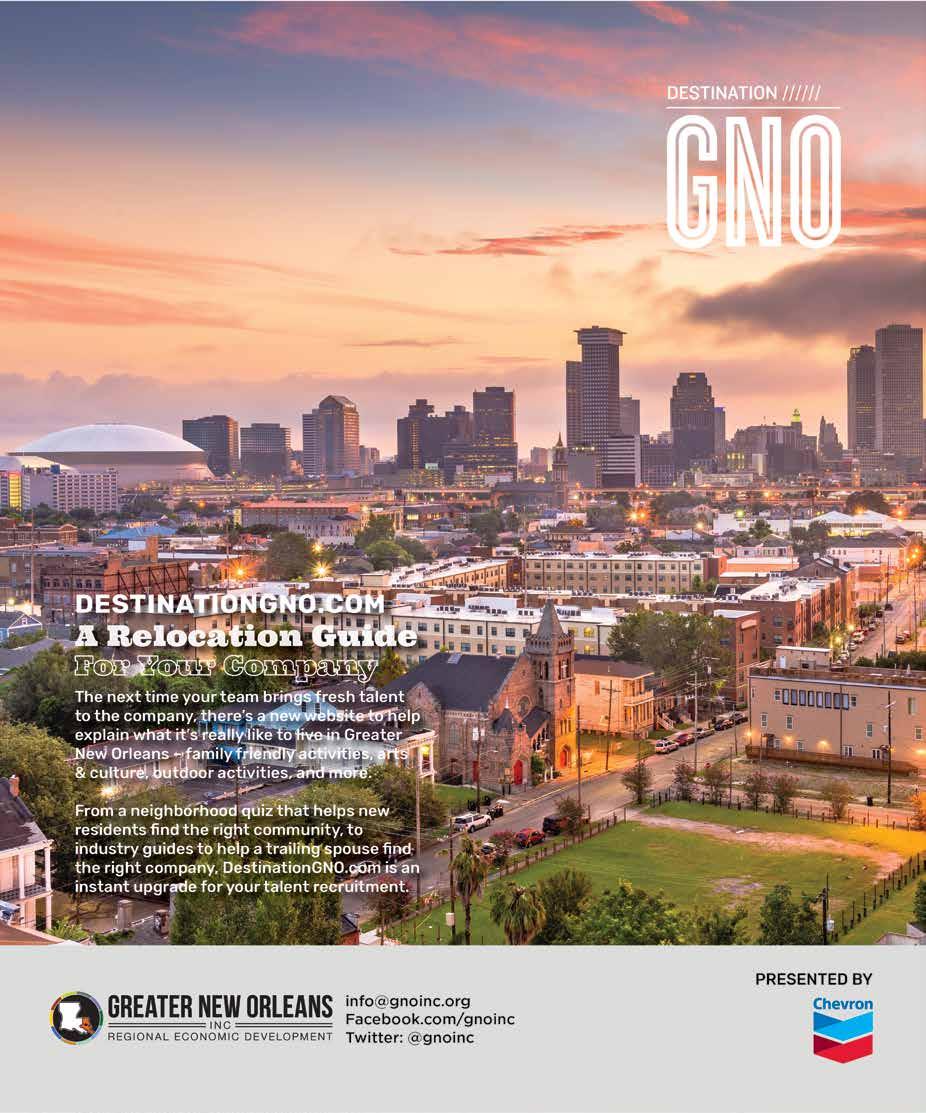

hile 2020 has rained economic hardship on many small and family-owned businesses, it has created unexpected opportunity for others. Some of these organizations, like grocery retailers, have found themselves in the right industry at the right time. Others have pivoted toward new strategies that enabled them to not only survive the pandemic but flourish.
One of these fortunate businesses is family-owned New Orleans Beverage Group, which owns the popular El Guapo line of cocktail bitters and syrups. As bar and restaurant closures decimated the company’s wholesale business, CEO Christa Cotton redirected sales to consumers stocking their at-home bars. This strategy, along with other savvy moves, has paid dividends for the company in the form of skyrocketing sales.
El Guapo’s bitters are made by hand and are zero-proof, non-GMO and gluten-free. The company’s entire product line (which also includes syrups and mixers) is high fructose corn syrup-free, but the bitters specifically are no sugar added. The 10 flavors sold on ElGuapoBitters.com for $19 each are diverse: from Chicory Pecan, Crawfish Boil and Gumbo bitters to Summer Berries, Polynesian Kiss and Love Potion No. 9. Cotton grew up in a small farming community in Southwest Georgia where her grandfather was a farmer, so she notes the company manufactures with the seasons.
“When Ponchatoula strawberries are in season, we’re making strawberry syrup and summer berries bitters,” she said. “We work with farmers in Ponchatoula to source berries and make sure we’re doing as much as we can to keep our money and our production in the local economy.”
This past April, just as the company’s sales began hitting new heights, Cotton was announced as one of only six women chosen as this year’s Les Dames d’Escoffier International (LDEI) Legacy Award recipients. Cotton specifically received the Mexico Fine Spirits Award from Jose Cuervo in Mexico. Established in 2009 and generously supported by The Julia Child Foundation for Gastronomy and the Culinary Arts, LDEI is an organization of women leaders in food, beverage and hospitality whose mission is education and philanthropy for the good of the global community.
Cotton spoke recently with Biz New Orleans about El Guapo’s banner year and the company’s efforts to support independent restaurant partners who are facing a tougher road.
What’s the family story behind El
Guapo? I really got started in this industry during college. My family owns commercial real estate around the Southeast, including a lot of the Rouses grocery stores here in New Orleans and all over. In 2005, during my first semester of college [at Auburn University], Katrina hit, and I ended up helping my parents restore coastal properties that had been decimated. We had multiple properties [that] had to be revamped and fixed after the storm.
My dad decided that as a family we needed to diversify because we almost went bankrupt going through that whole process. He saw an article in the Wall Street Journal about a distiller in Atchison, Kansas, who had just opened a craft distillery. This was before the real boom of craft distilling and craft brewing in America. He drove himself to Kansas and hired this guy as a consultant, and I spent my last half of college helping my parents open Thirteenth Colony Distilleries, which was Georgia’s first legal distillery. It was a dream job for a 21-year-old.
Once I graduated in 2010, I wanted to learn more about marketing and had the opportunity to work in New Orleans at Trumpet, the ad agency. My main client was the Louisiana Office of Tourism, so I worked on state advertising campaigns, focused on food and music, and built a lot of strong relationships with chefs, restaurants, hospitality groups and festivals. But I missed making things.
Ultimately, I had the opportunity to buy the trademark from El Guapo. I was hesitant to do it, but, after sitting down with my family and going through the numbers with my parents, they said, ‘If you don’t do this, we’re going to.’
That was the push that I needed to buy the trademark in July 2017, and I started New Orleans Beverage Group, which owns the trademark, but now we also own and operate an acidified foods manufacturing facility and are able to co-manufacture, co-pack and private label for other brands. Our products are currently available in 28 states and four countries, and we are in the process of expanding our work here in New Orleans.
Brian — my life partner, business partner, all things partner — is a CPA and wanted to be a part of this, so he left his job to be here with me, and he’s really helped me build this into where we are today. He’s our CFO, and we have a 2-year-old daughter, Flora.
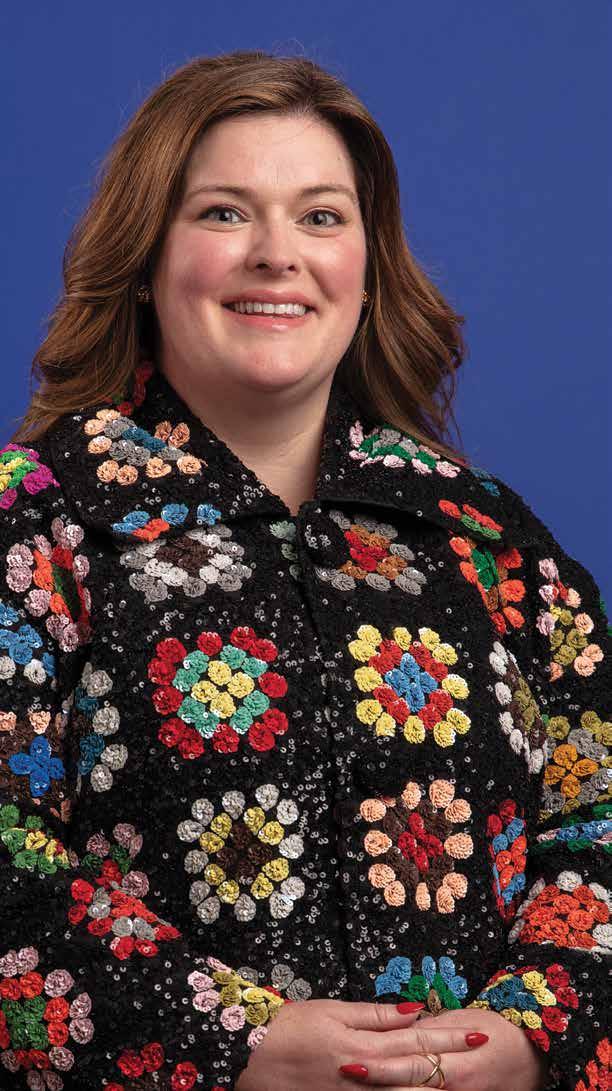
How has 2020 been for business? I clearly remember being at dinner with my mother on March 8, when my phone rang. It was our buyer from Costco. Last year, I pitched Costco in Dallas and we were in the midst of rolling out our products in 24 stores across Texas, Oklahoma and Louisiana. In one phone call, a quarter of a million dollars was wiped off our projections for the year. They literally pulled our spaces from the store because they needed the room for extra toilet paper.
Immediately, we were trying to figure out what to do with this inventory. It probably took me a good two to three weeks to get over the initial shock. March was bad: We didn’t have very many orders, all of our restaurant partners were closing, and I was really concerned about what was going to happen.
Before the pandemic, maybe 60 to 65% of our business was wholesale and distribution, and the remaining percentages were retail sales. We didn’t put a heavy emphasis on retail sales because the bread and butter of our business was B2B.
We invested a lot of our resources into beefing up our e-com presence through our website, also through Amazon, and ultimately, we flipped our business model. We went from majority wholesale to dominantly direct-to-consumer e-com fulfillment. As soon as we made that switch, we saw our sales skyrocket. Looking at our numbers in April, I think we were up 822% over April of 2019.
It has evened out a lot, but that initial pop of sales going crazy was really good for our brand exposure. It was great for us to have a way to talk with our consumers.
How has this year pushed you creatively
as a company? We are trying to find economical solutions to problems we’ve never experienced before. Our team is very creative, and we’ve been able to do a lot without spending a ton of money to get things done. Capital is hard to come by these days. Trying to do all these things while keeping your revenue and capital in a good spot, while your numbers are going crazy and you can’t really go out and raise money, has been an interesting experience, but somehow we’re making it work.
We’ve spent a ton of time on our recipe blog. People are searching online. They want interesting cocktails that they can make at home but don’t take a million ingredients. We’ve had a lot of
MAKES ONE COCKTAIL
3 oz bourbon (we used @13thcolony) .5 oz El Guapo® Creole Orgeat 8 dashes El Guapo® Holiday Pie Bitters 1 large rock of ice 2 Luxardo cherries, yard flowers and leaves, to garnish
In a lowball, combine bitters, syrup & bourbon. Stir to combine and place one large rock in glass. Garnish with cherries and any other desired accoutrements. We chose yard flowers & a tropical leaf… because optimism.
[For more recipes, visit ElGuapoBitters.com or on Instagram @ elguapobitters] customers ordering gift boxes for virtual happy hours or birthdays or big celebrations that people can’t get together for anymore. Social media has been really important to us throughout this whole process.
Through the pandemic, we have had Fortune 500s, universities, all sorts of partners reach out to us wanting to do virtual events. We’ve done virtual conferences, team building exercises… We put together and ship cocktail kits, and then we teach a virtual experience where we incorporate trivia or history of cocktails and a Q&A session. They have been extremely popular. Now, a lot of our business, in addition to e-com, is virtual events. Before the pandemic, we had never done a single virtual event.
How do you plan to maintain those gains once life returns to normal? I don’t think we really know what that new benchmark will be. I don’t think our company will, for at least the medium term and maybe even the long term, ever go back to being 60 to 65% wholesale. I think retail will be a more integral part of our business and a bigger percentage in our revenue than wholesale, at least for the medium term.
I think emphasis on direct-to-consumer is something we will continue in the future, because now we have loyal customers that are buying from us online in regular intervals. We have people that religiously purchase once a month, and I don’t see that going away, even as the pandemic gets better. Retail partners will always be important, but that component of online shopping is something we just have to integrate into our business and keep up and running.
Are you still able to collaborate with your restaurant partners? It’s sad because so many of our restaurant partners are independent restaurants that are really struggling. We’re trying to figure out ways to help. It’s a double-edged sword because we’re doing great, but the partners that had supported us and that we love so much are really going through a hard time.
We talk with chefs every day about ways to get into the consumer, packaged goods space. Even if it’s not with us or with a product that we can make, we’re trying to connect chefs with the right manufacturing partners to get a product on the shelf and get revenue coming in the door from a hot sauce or a king cake, whatever the case may be.
I feel like as a business owner, rising tides raise all ships, and a lot of these chefs have been champions of our brand. It’s our time to advocate for them and help them in any way possible. We are also working on some co-manufacturing products with local brands and chefs here in town, and holiday ideas to partner with chefs on cocktail kits. The majority of the revenue from that goes back to the chef or to the restaurant so that they have a holiday sales item to push to their customers, bringing revenue in the door at a time when they’re struggling.
When it comes to drinking, we do partner with as many local distilleries as we can, but we offer non-alcoholic options and alternatives on our social media and our blog. You can search “zero-proof cocktails” and find several options for ways to have an interesting drink that doesn’t necessarily have to be alcoholic, because we don’t think that you should be out there having four or five cocktails every single day.
What can customers look for as the
holidays approach? We have holidayspecific products: our holiday pie bitters and a sweet potato syrup that has won a Good Food award. We also have Creole Orgeat, made with pecans that my uncle grows. Those products are great for milk punches and Old Fashioneds.
Biz: On a personal note, how has it been juggling parenthood with business during a turbulent time?
Cotton: Impossible. I think, like most working moms, I feel like I’m always failing somewhere. We’re at least able to support all of our business partners because we order takeout an embarrassing number of times per week. There’s just not enough hours in the day. From an employer perspective and a work-life balance perspective, it’s also making us rethink how we want our company to be structured and what we can be doing better as employers in the future.
What does the future hold for El Guapo?
It’s funny, when I started this, I wrote five goals on a piece of paper. We’re dangerously close to getting four of the five completed by the end of the year, so maybe I need to dream bigger. We’re trying to expedite a growth plan that is smart and sustainable. We want to build an actual factory. We want to figure out how to make some of these partnerships and opportunities that we’ve gotten from COVID-19 into permanent relationships. We want to be great employers, and we want to figure out how to grow to become the size of the business that we want to be, but also keep our values, brand and personality the same. As you grow, things change, and you can’t always hold onto all of that, but these are conversations we’re having internally. We’re trying to be smart about the opportunities that we capitalize on and trying to build the best strategic plan for growth in the future, beyond COVID-19. n
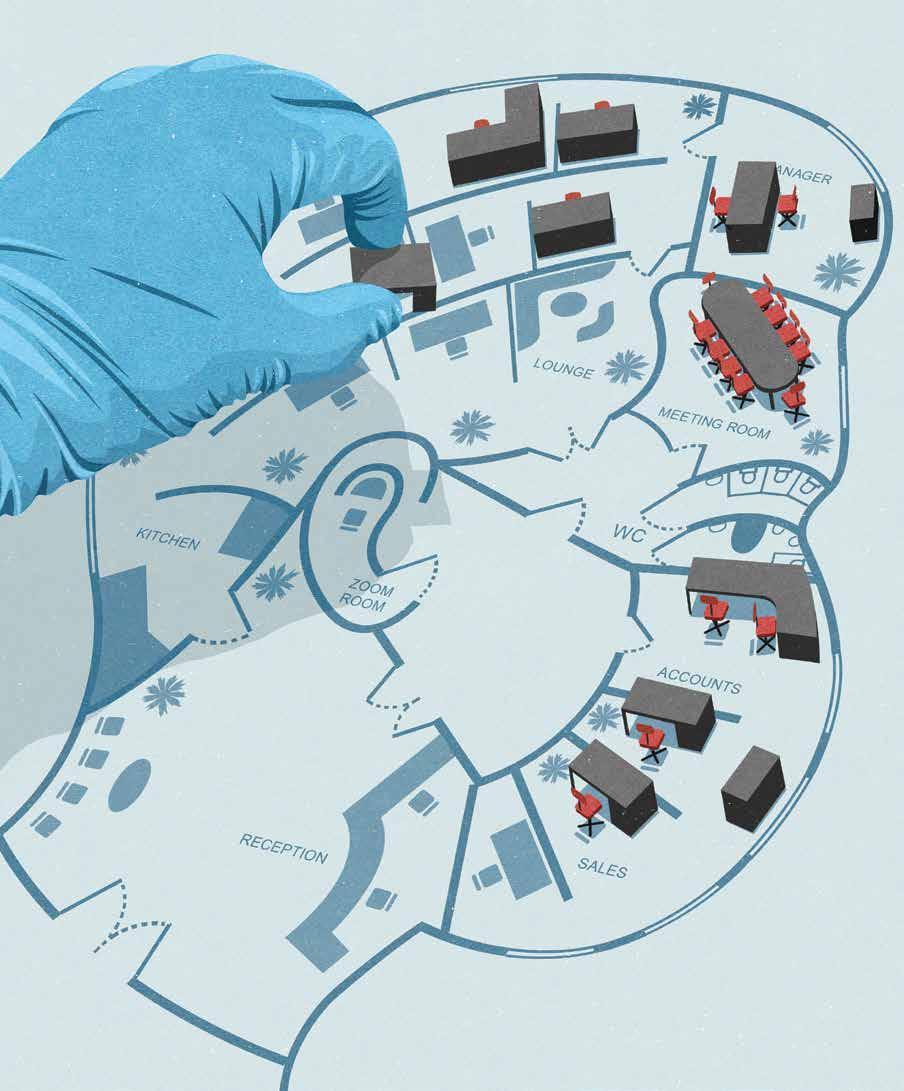
Office
By
Ali DeFazio Eva Fedderly and Kim Singletary
Illustrations by
John Holcroft
The pandemic has changed everything about how we live and work, but what changes in the workplace are here to stay? Local professionals share their thoughts on what we can expect.
Futureof the
Prior to the pandemic only 17% of employees in the United States worked remotely five or more days a week. That number jumped to 44% in April of this year according to a recent report by Statista. Remote work quickly became necessary to stop the spread of disease, but will it continue after a vaccine? The present thought is yes, at least in some form.

In June, a study by PricewaterhouseCoopers found that 55% of participating employers reported they anticipate most of their employees will work remotely at least two days per week after the COVID-19 threat is over.
This isn’t surprising to Amy Bakay, CEO of HR NOLA, who said many employers are recognizing the benefits of remote work — which can include a more engaged workforce and lower overhead — and even asking themselves, “Why didn’t we do this before?”
“This pandemic has proven to many organizations that working remotely can be cost efficient, productive, and if implemented correctly, can improve work-life balance,” she said. “If all workers can be remote, imagine the global talent pool you now have access to. Remote work flexibility can be mutually beneficial to the employer and employee if there is proper communication, the right equipment, clearly defined objectives and a lot of flexibility.”
So how will this workforce shift affect the office of the future?
PART 1 Space
LEASES When it comes to the state of office leases in New Orleans, it might be too soon to tell. Snappy Jacobs, owner of CCIM Real Estate Management, which leases office spaces, said he hasn’t had any office clients fail to renew a lease or end one early yet.
“I think the pandemic has put things on hold, if anything,” he said.
Jacobs does, however, think office spaces will get smaller. He said clients have expressed interest in spaces with fewer common areas, including fewer parking garages and elevators. The goal, he said, is “a smaller space that can be more flexible.”
While some businesses are thinking small (especially those that plan on keeping a good portion of their workforce remote all or most of the time), others are looking for a larger space, one that allows for adequate social distancing. Blaine Gahagan, founder of property management firm HGI Facility Management in Elmwood, said he had one national company not renew their lease only for another to snatch up the space so they could expand their offices. “It became a net effect,” he said. “We didn’t lose any leased space.”
Gahagan said he predicts office space will fluctuate.
“It’s going to swing to remote and less density,” he said. “And then it’s going to swing to more traditional or a combination of traditional and remote.”
COWORKING SPACES The demand for flexibility and affordability in an uncertain economy is leading some companies to coworking spaces “I don’t think the skyscraper is dead, but for smaller businesses this is a great option,” said Genevieve Douglass of Urban HUB, a coworking space in the Lower Garden District. Urban HUB offers an array of options and price points, from super flexible — the option to occupy a desk on a first-come-first-served basis for $30 a day — to the more stable option of renting a dedicated desk that includes mail service, locked storage and signage for $400 a month.
“This is a place where there’s a community, and it also offers a chance to get out of the house where people can have dogs and children and bad internet,” said Pamela Meyer of The Shop, a coworking space located inside the Contemporary Arts Center in Downtown New Orleans. “We offer a solution that someone could use daily like they’re used to, or just off and on as needed.” In addition to day passes and dedicated desks, The Shop can also provide a furnished office space for a team of up to eight people, as well as meeting and event space.
Of course, with coworking spaces comes… well, working around others. Here, both The Shop and Urban Hub have spaced out seating and added sanitation stations. Urban HUB, for example, is currently limiting occupancy to 50%, has placed hand sanitizing stations throughout the space and boasts multiple points of entry as well as outdoor space.
At The Shop, users are required to sign in in an effort to keep track of occupants and enable contact tracing if needed.
“Now that we’re in phase two, we will allow guests, but we’re very strict with it,” said Meyer in early September. “They have to be pre-registered and we use a wifi check-in.” She added that The Shop is sanitizing surfaces once every two hours and uses nano-septic wraps — a self-cleaning rubber material that uses an oxidation process to break down germs — on touchpoints like door handles.
LAYOUT CHANGES Is the idea of an open-air office doomed to become a relic? Not necessarily, said Alexis Miranne, business developer at office design firm AOS.
“So many people want to say, ‘Well, we’re going to get rid of open desking.’ And that’s not necessarily a fix for everybody long term, right? The question is really, about how can we have the agility to be flexible?”
While flexibility can look different depending on needs, there are small changes offices can make, like switching to disposable dishware to lessen the spread of community germs. The plexiglass dividers we’ve become accustomed to seeing are most likely here to stay. Some office managers are starting to think about longer-term solutions like glass dividers.
“One thing we’ve seen manufacturers develop really quickly are pop-up solutions within an office space,” said Miranne. For example, phone booths that offer privacy in a world where telecommunications have become increasingly important. Offices that can’t afford phone booths could consider re-allocating old spaces into areas exclusively for teleconferencing. That’s right — goodbye, conference room. Hello, Zoom room.
When AOS started work on office layouts during COVID-19, the company’s Director of Marketing, Caroline Hayes, said effective
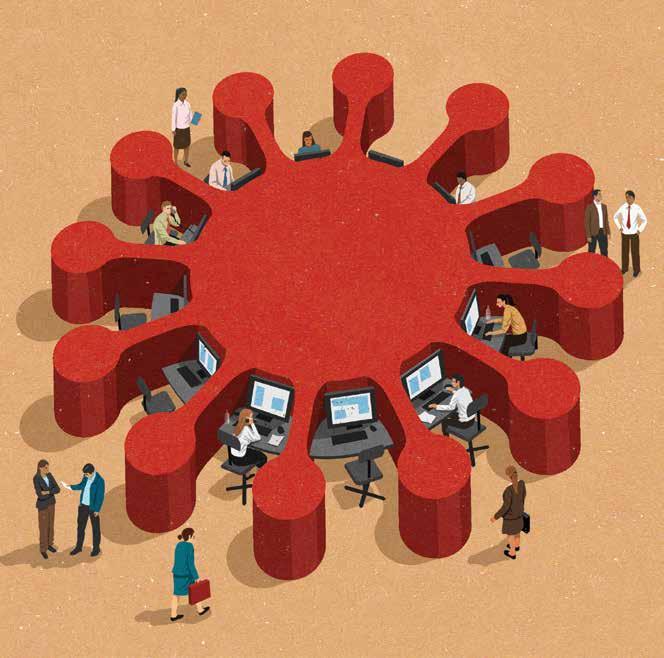
Blaine Gahagan, founder of property management firm HGI Facility Management, on commercial office space trends.
communication quickly became a cornerstone of every plan.
“It’s not just the furniture or the floorplan, you know, it’s about looking at how people interact in a space,” she said. With AOS’s clients in higher education, however, Hayes said it doesn’t matter how much you spend on safety amenities if students and staff don’t use them effectively. For this reason, she said offices will start including signage around how many people are allowed in a room, as well as arrows to direct foot traffic and designated entry and exit points to avoid crowding in common areas.
So, what about the open-air office? Miranne thinks it’s here to stay — just with the addition of dividers and desks positioned at least 6 feet apart.
PART 2 HR and Legal
HIRING With much of the workforce currently remote, hiring during a global pandemic has presented a challenge. Amy Bakay, CEO of New Orleans-based human resources firm HR NOLA, said companies have been getting creative when it comes to attracting and hiring skilled employees.
HR NOLA recently hired a team member that nobody on the staff met in-person.
“We had several discussions, conducted panel video interviews, utilized the Predictive Index Behavioral and Cognitive Assessment, checked references and made an offer [to a recent employee],” said Bakay. “We will onboard electronically, provide orientation through video calls and send the welcome gift to their home. The only thing we have not done yet is elbow bump to make a human connection.”
Corporate Playbook President and CEO Deborah Elam, who specializes in business consulting for executives, believes remote hiring is here to stay and added that it provides an opportunity for diversifying the workplace. “Workers who have physical limitations will be able to more fully participate in the workforce on an equal footing,” Elam said. “They won’t have to come into the office just to be ‘equal.’”
KEEPING EMPLOYEES HEALTHY AND ENGAGED
With so much screen time and less in-person connection, employee engagement can suffer. Here, again, companies have been forced to get creative, making efforts to host virtual happy hours, cooking classes and even mindfulness meditations.
The line between work and personal responsibilities has also been blurred as parents have taken on remote schooling responsibilities or employees may find themselves in the position
Employers “ need to think outside the box when it comes to expectations of ‘normal’ work hours if it will help employees deal with childcare and self-care needs.
Stefanie Allweiss, co-founder of Gotcha Covered HR of having to care for a loved one. Mental health, said Stefanie Allweiss, co-founder of Gotcha Covered HR, has to be a priority.
“Offering flexibility during the workday, permitting generous use of PTO, and making adjustments in scheduling work hours are some ways to help employees take needed breaks for self-care,” said Allweiss. “Employers need to think outside-the-box when it comes to expectations of ‘normal’ work hours if it will help employees deal with childcare and self-care needs.”
Since the pandemic, many employers are prioritizing health and wellness over all other business initiatives. Over the past six months, there have been myriad new COVID-19-related federal, state and parish guidelines, mandates and laws directed at customer and employee protections and protocols, including those around attendance and timekeeping, remote work, vacation and sick leave, as well as temperature testing, company safety, security and hygiene, and travel policies.
Helene Wall, associate director of Louisiana-based accounting firm Postlethwaite & Netterville, said best practices suggests that businesses maintain their own procedures separately from employment-based policies through the use of a comprehensive employee handbook. Training on policy administration is the best method to ensure consistent application of policies across the workforce.
“Keeping them separate provides options to make effective workflow changes quickly and limits the risk of having outdated or incorrect information in writing that could adversely impact the organization,” she said.
WORKER’S COMP The pandemic has presented multiple challenges when it comes to worker’s compensation. Essential workers, such as health care workers, mass transit operators and grocery store employees, are at a high risk of exposure to the virus while at work, but are not guaranteed that a COVID-19 infection would be covered under workers’ compensation in most states. In Louisiana, employers are not liable if an employee or patron claims to have contracted COVID-19 at a workplace unless the company exhibits gross negligence.
And how does worker’s compensation work if employees are working from home?
“Generally speaking, an injury or illness suffered by an employee which occurs during the course of employment is compensable, regardless of where it happens, said Wall. “With the new normal of working from home, employers should strongly consider updating their employment policies to account for scenarios outside of a traditional office environment. This may include new or updated policies that address such issues as workers’ compensation incident reporting, guidelines for a designated workspace, safety and security in the remote workplace, and care and use of company-provided equipment, among others.”
PART 3 Safe and Secure
A NEW LEVEL OF CLEAN Remember when periodic vacuuming, dusting and emptying trash bins was enough? Those days are gone, likely for good, said Brock Dumestre, owner of a local disinfecting company called Bactronix.
“Cleaning commercial spaces now is all about completely removing the biological fingerprint of a person,” said Dumestre. “And this isn’t just a COVID-19 problem. Even after this disease has passed, there will likely be others. This issue is going to be around for a while. In fact, I wouldn’t be surprised if OSHA gets involved and expects companies to have a biological mitigation plan. That seems logical.”
The biggest buzz word in cleaning right now is electrostatic spraying. Around since the 1940s, electrostatic spraying is a process in which a liquid is
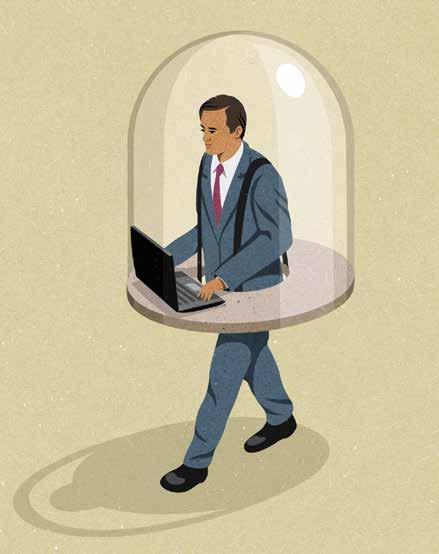
positively charged as it is dispensed through a nozzle. The charged droplets repel each other; since most surfaces are naturally negatively charged, they bind to them. This type of cleaning allows all areas of a surface (think nooks and crannies) to be reached quickly with less product.
Barrett Wiley, owner of Cleaning Concierge, a commercial cleaning company operating in New Orleans since 2009, said he’d typically see requests for electrostatic cleaning outside of day care centers, schools and medical facilities only very infrequently, for instance during cold and flu season. Since the pandemic, he said demand has increased by “at least 100%.”
The CDC has a list of almost 500 approved common cleaners for COVID-19, along with recommendations on how long a surface must remain wet to be effective — times range from 30 seconds to 25 minutes. The database is searchable by a product’s EPA registration number.
Whatever company or products they choose, Dumestre cautions employers to do their homework.
“[Commercial cleaning] has become a very crowded space right now as everybody rushes to check off boxes,” he said. “I encourage people to ask a lot of questions. What are the differences in application methods? What type of disinfection are you getting and how long does it last? And, most importantly, has it been tested? Do you get any kind of report or certification? Documentation is very important right now to provide a company with protection if needed.” CYBER SECURITY Eight-hundred percent — that’s how much cyberattacks in the United States reported to the FBI had increased barely two months into the pandemic, making it unsurprising that in May, Computer Weekly stated “Coronavirus may be the largest-ever global security threat.”
“We’ve seen unified commercial platforms like Zoom and Teams get hacked recently,” said Stephanie Kavanaugh, sales and marketing director for Universal Data, a cyber security-focused IT firm operating in New Orleans since 1982. She said the majority of attacks she’s been seeing locally are phishing attempts, where a person is tricked into opening an email or text message and that breach is used to gain secure information.
“It’s really important to strengthen what we call the ‘human firewall,’ meaning educating employees on how to recognize a potential threat.”
Kenny Grayson, owner of Grayson Data, a New Orleans IT company launched in 2016 that specializes in working with small businesses. He said small businesses are typically used to operating remotely, but many medium-sized businesses were not, which meant there was a bit of a scramble to move from one corporate network to a remote workplace where each employee could be at home on their own network with their own equipment. Grayson said he has been moving businesses to a Cloud-based setup — like he uses with his own company — to help with security issues.
Ted Nass, co-owner and VP at Avexon, a New Orleans software development and technology company formed in 2018, said his company has been busy moving companies from a traditional remote connection, or Virtual Private Network (VPN), to a Virtual Desktop Infrastructure, (VDI).
“With a VPN you have to pay for each license so a company could have 5,000 employees but had only purchased 1,000 pieces of equipment [laptops] with licenses because they didn’t think more than that many people would be working remote at one time,” Nass said. “Then the pandemic comes and now they’re stuck without the access they need. A VDI system, on the other hand, works almost all through a web page. It’s more secure as you can set a user to any level of access and you can use any device you want to work. You can login at the office and then go home and login at home on your laptop and be right where you left off.”
While once a very expensive option, Nass said he’s seeing the pricing coming down on VDI.
“The Cares Act covers this type of thing and so do some grants,” said Nass, noting that an investment in a better remote setup also makes sense with the multiple weather interruptions we can have in this region.
“The South is a little behind in terms of moving to VDI, and Louisiana and Mississippi are at the tail end,” he said. “But in the last two years things have started to ramp up.” n
Local Companies Innovating for COVID-19
DigiTHERM — has developed an infrared body temperature scanning kiosk that is non-invasive, easy to use and offers a socially distant way to take temperatures. Any temperature over 100.4 degrees Fahrenheit triggers an audible and visual alert, enabling employers, restaurants and venues to effectively and immediately detect potential hazards.
IDSCan.net — created a device that pulls information from the barcode on any driver’s license in order to easily record the names and phone numbers of all customers. Since 2003, IDScan.net has developed identity verification and information gathering technologies for more than 6,000 clients.
Stop & Block — Makers of sunscreen weatherproof, battery-powered dispensers, the 3-year-old company has pivoted to create touch-free dispensers of hand sanitizer at local office buildings, shopping malls and other locations where people gather.
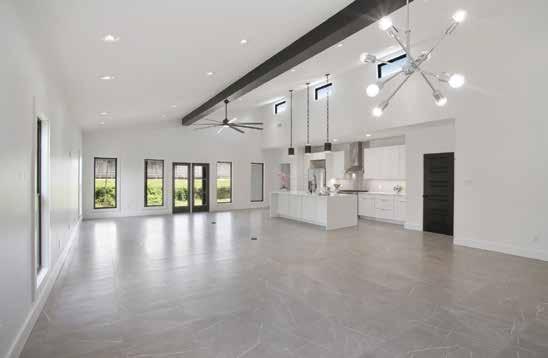

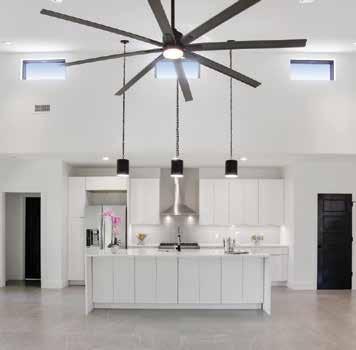
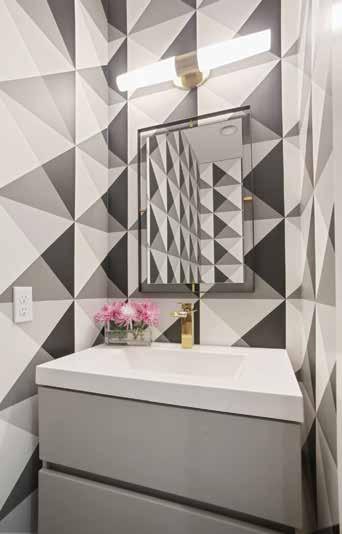

BIZ FORWARD BUSINESSES DISCUSS THEIR ROAD TO RECOVERY

UNPRECEDENTED TIMES CALL FOR UNPRECEDENTED MEASURES. As our city, our state and the world adjust to ever-shifting standards of normalcy, businesses are finding innovative ways to adapt and position their teams for continued success. While the road to recovery may be paved with uncertainties and challenges unique to each industry, one thing is certain: New Orleans is no stranger to resiliency, and our professional community has all the expertise, prowess and determination needed to emerge stronger and more prosperous than ever. In this exclusive section, Biz New Orleans asked business leaders about their tactics for readjusting, working remotely and staying focused on their corporate missions during the historic COVID-19 pandemic.
TELECOMMUNICATIONS A Culture of Connectivity
Strong, steadfast values keep people and businesses united.
NOW MORE THAN EVER, PEOPLE ARE relying on innovative technologies to keep them connected in both their personal and professional lives, and Cox Communications continues to play a key role by providing a full range of crucial digital services.
Even before the onset of the pandemic, the company was making great strides in transforming New Orleans and other serviced areas into what Senior Vice President & Southeast Region Manager Anthony Pope calls “smart cities.” Their mission, which includes the superfast residential internet service G1GABLAST, is to create an infrastructure of cuttingedge technology that seamlessly unites businesses, schools, homes, hospitals and other essential industries.
And to ensure customers receive the highest standard of service and support, Pope is careful not to lose sight of one of the most important pieces to the puzzle: Cox’s own employees. After all, the strength of the company — and the impact it has on those who rely on their innovation and efficiency — starts with the skilled workers who are making the technologies of tomorrow a reality today.
In what ways are you thriving and pushing forward as a business during COVID-19? The sudden and successful pivot of my employee base to a remote work strategy is pulling us forward in new and introspective ways. We’ve removed the traditional rigidity about where our employees work without sacrificing productivity, and we’ve improved the customer experience by emphasizing the quality of the job and virtual technical support to keep New Orleans safe. The world changed overnight, and in response, so did we. This has empowered us to continue meeting our customers where they are so they can work, play, teach and connect with friends and loved ones.
How have you maintained a sense of company culture? At Cox, our values come first. Throughout 2020, we’ve remained very intentional in listening to our employees while offering clear guidance and support. As further care, we provided $1,000 to all full-time employees to help cover unexpected expenses related to the pandemic. We introduced flexible work options; are helping to cover elder and childcare costs; have rolled out heightened safety, mentorship and wellness programs; and are offering employees paid time off to vote. We’ll always remain very purposeful as to how we care for our people, even when we’re working together in new ways.
I’m equally proud to share how these values flow into the neighborhoods we serve. Here locally, we’re championing social justice initiatives, stocking local food banks, feeding and providing PPE to healthcare providers and equipping low-income children with school supplies, portable devices and low-cost internet. Our One Call a Day campaign partnership with the New Orleans Saints is also helping us connect with area locals who are in nursing homes and assisted living facilities. Our goal is to build bright futures for everyone.
Are there any lessons you have learned? Any new technology you’ve embraced? Technology will continue to evolve, but our desire to connect with each other won’t. Our employees, customers, communities and vendors want to be seen…and deserve to be heard. We’re actively listening and in response, we’ll continue making significant investments in our network and other platforms to ensure you stay connected to what and who you care about most.
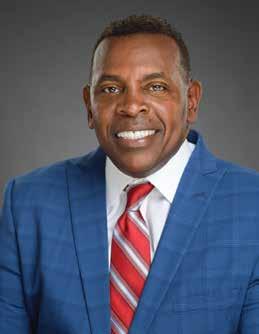
“We’ll always remain very purposeful as to how we care for our people, even when we’re working together in new ways. ” ANTHONY POPE SENIOR VICE PRESIDENT & SOUTHEAST REGION MANAGER
COX COMMUNICATIONS ACADIANA | BATON ROUGE | NEW ORLEANS | FLORIDA’S GULF COAST | CENTRAL FLORIDA | MIDDLE GEORGIA • COX.COM

When it comes to business in this country, it’s most often a family affair
— 90% of all business ventures in the United States are family-run, including 35% of all Fortune 500 companies.
Here in Southeast Louisiana, we’re proud to have our own array of family-run superstars that represent a wide range of booming industries, and we are excited to share our annual showcase of local family-owned and family-run businesses. This group of hardworking professionals, along with their families, have fostered legacies that continue to set the standard for excellence, service and prosperity in our region.
SPONSORED BY
A Clearer Path
THIRD GENERATION
Cenac Marine Services
742 HIGHWAY 182 HOUMA, LA 70364 (985) 872-2413 CENAC.COM
THREE GENERATIONS OF THE CENAC
family have led Cenac Marine Services — and upheld its deeply rooted values — since the company was founded in 1927. The family legacy was started by Jock Cenac, who believed that excellent customer service and outstanding employee morale were the keys to success and longevity for any business. More than 90 years later, and after passing through the care of Jock’s son, Arlen Sr., and current owner, Benny Cenac, those values have withstood the test of time.
Over Cenac Marine’s lifetime, the maritime industry has made great strides in innovation and technology, and the company has evolved in turn. Keeping up with and embracing new ways to do business and serve customers is one of the many ways the company — and Cenac himself — ensures the prosperity of the region and state.
And because of its ancestral beginnings, Cenac takes care to make his company feel like a second home for his employees. His philosophy is simple but effective: take care of your

people, and they’ll take care of you. Cenac exemplifies that principle through every facet of his company, whether that means providing outstanding benefits and resources or simply offering support. He maintains an open door policy for all his staff — or in the time of social distancing, an open phone line.
“The most important value that was instilled in me was the unique opportunity a family-owned business can capitalize on,” Cenac says. “The company has grown larger and larger but has never lost sight of the benefits of treating everyone
(ABOVE) Benny’s fondest memories at Cenac have been shared with family. Pictured are his two sons and late father, Arlen B. Cenac at a boat christening. (RIGHT, TOP) Cenac Marine employee working on the building of a new ship. (RIGHT, BOTTOM) Tier IV Tractor Tug being built at Main Iron Works for Bisso.
DID YOU KNOW?
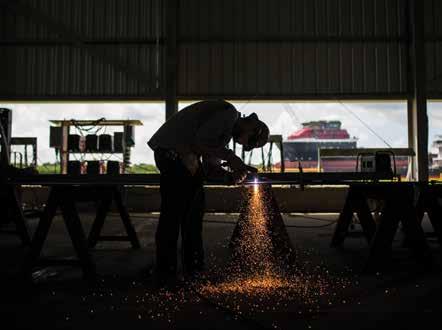

Benny Cenac, Jr. is the owner of Louisiana’s largest privately owned refuge, Golden Ranch Farms, where he raises various animals, including blackbuck antelope, oryx, Père David’s deer, axis, elk, sika and even zebras. like family. This foundational belief has not hindered growth but enhanced it, as generations of employees have made Cenac a leader in the industry.”
When obstacles do arise, as they certainly have in 2020, the team at Cenac Marine Services is well-equipped to meet any challenge proactively and unitedly. As the winner of a Safest 70 award from the Louisiana Workers’ Compensation Corporation, the company reinforced its reputation as a leader in safety by enforcing strict guidelines to protect the health of all employees, partners and their families during the pandemic.
“The challenges brought this year have certainly been unique. However, my father and my grandfather faced many unique challenges over the years,” Cenac says. “Their dedication, persistence, and determination are all ingrained in me as I watched them navigate through obstacles over the years. Their spirit lives in me as we tackle yet another obstacle in our way. The team here at Cenac has always risen to the occasion under difficult circumstances.”
Cenac is equally passionate about supporting his local community through philanthropy, another virtue instilled in him by his father and grandfather. Coastal restoration and climate conservation are of profound importance to him, and he strives to make a difference by volunteering his time with organizations like Restore or Retreat, Coalition to Restore Coastal Louisiana and Louisiana Wildlife and Fisheries Foundation.
Through it all, Cenac never loses sight of what makes Cenac Marine’s success, prestige and resiliency possible: the vision and dedication of the family members who paved the way before him.
SECOND GENERATION
Classic Interiors
2017 WILLIAMS BLVD. KENNER, LA 70062 (504) 466-0431 CLASSICINTERIORSNOLA.COM
WHEN CLASSIC INTERIORS WAS founded in 1980, family was always envisioned as the heart of the operation. Not only is the company family owned and operated, but when customers call on the team of sales, design and installation professionals, they’re trusting Classic Interiors to design
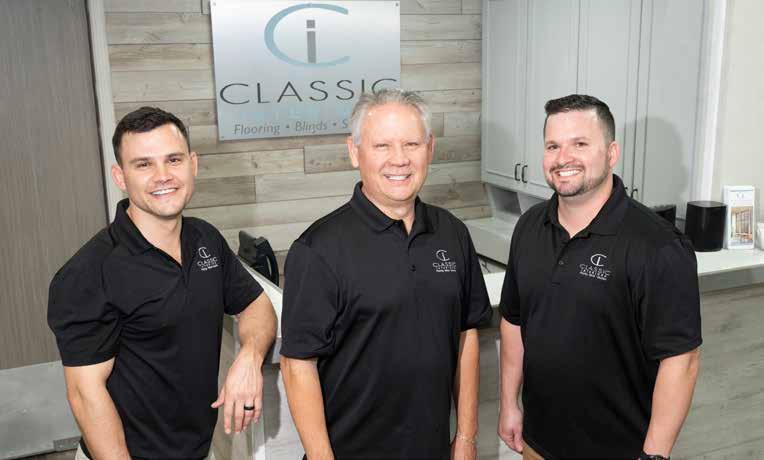
spaces that are perfectly suited to their own family’s needs and lifestyles. It’s a responsibility not taken lightly, so from the second a client schedules a consultation, Bill Bourgeois and his dedicated staff use their years of knowledge and expertise to make every client’s vision a reality.
“My father instilled the value of hard work to achieve success,” says Bourgeois, who now runs the family business alongside his two sons, Michael and John. “I feel that I have passed on this traditional value to all of my children and our work family. Everyone at Classic Interiors strives to have advanced product knowledge, and everyone working here, at one point, has installed the products they sell.”
Whether working on a residential home or a large commercial project, Classic Interiors (PICTURED FROM offers a range of elegant window treatLEFT TO RIGHT) Michael Bourgeois, Bill Bourgeois, ments and flooring options suitable for any customer’s budget. Their showroom John Bourgeois features an extensive Hunter Douglas gallery, automated window coverings, interior plantation shutters, custom tile showers, backsplashes, wood, vinyl, porcelain, laminate flooring and more.
Customer satisfaction is always the number one priority, and Bourgeois says there’s no greater reward than hearing a customer express their satisfaction with their experience.
DID YOU KNOW?
While the Bourgeois family’s leadership has always been the same, the company has gone by a few different names. Once called Classic Flooring, Paint and Decorating, Inc. and Blinds & Shutters Direct, the company was rebranded as Classic Interiors to reflect the full scope of available products and services.
FOURTH GENERATION
Dupuy Storage
4300 JOURDAN RD. NEW ORLEANS (504) 245-7600 DUPUYGROUP.COM
MORE THAN 80 YEARS HAVE
passed since John Dupuy opened a coffee warehouse in New Orleans, starting a legacy that would transform Dupuy Storage into the leading global logistics and storage provider it is today. The intervening years have been marked by change and innovation, as the company’s footprint has grown from its humble beginnings on South Peters Street to encompass additional facilities in South Carolina, Texas and Florida.
One thing that hasn’t changed, however, is the company’s dedication to its deeply rooted values. Four generations of the Dupuy family have upheld the same standards of trust, reliability and service that have become synonymous with The Dupuy Group. Today, that task is helmed by the father-daughter team formed by President Allan Colley and Vice President Janet Colley Morse. The pair have worked in tandem since Morse’s childhood to ensure the preservation of the company’s central ideals, which has only served to make the company — and its relationships with customers and staff — stronger than ever.
According to Allan Colley, it all comes down to three simple steps: “Keep your word. Empathize with others. Do what’s right.”
Equipped with these guiding principles, the company has been able to adapt to changing times and technologies, never sacrificing its commitment
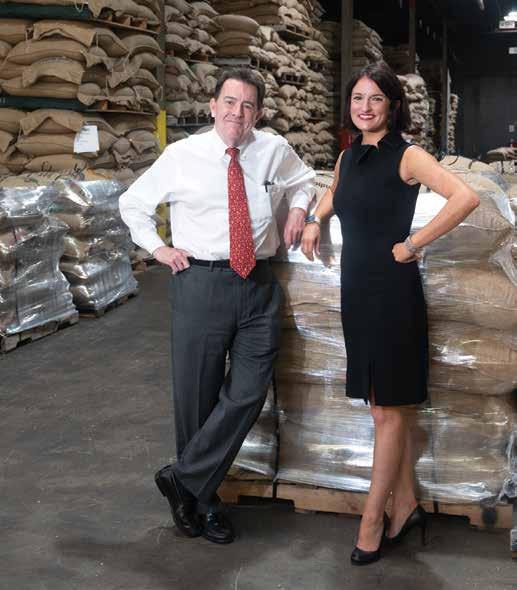

to quality and customer satisfaction — and that remains true as Janet makes her own mark on the family legacy.
DID YOU KNOW?
Dupuy New Orleans opened the first green coffee silo facility in North America in 1992.
FIFTH GENERATION
Jacob Schoen & Son Funeral Home
3827 CANAL STREET NEW ORLEANS, LA 70119 (504) 482-2111 SCHOENFH.COM
FOR NEARLY 150 YEARS, JACOB
Schoen & Son has been committed to providing families of all cultural backgrounds and walks of life with the highest standard of memorial and funeral services regardless of financial circumstances. Though the business has seen many expansions and transformations since its founding, five generations of the Schoen family have maintained the legacy of compassion, dedication and sensitivity that New Orleanians have come to know and trust.
“Compassion and consideration have been the guiding principles for the Schoen family and its many dedicated employees since 1874,” says managing partner Patrick Schoen. “We are passionate about making a family’s time with us as memorable and uplifting as possible. It is our attentive personal concern that distinguishes us and allows us to give families the peace of mind that their loved one is well taken care of before, during and after their funeral.”
The business boasts an extensive range of services, ranging from pre-planning arrangements and 24/7 assistance to burials, cremations, memorials and Military ceremonies. The integration of
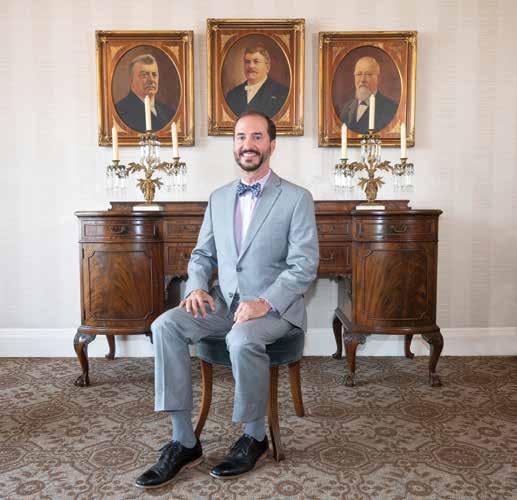

modern technology allows family and friends to participate in and remember their loved one’s funeral from anywhere in the world through both live streamed and recorded webcasts.
No matter what a family needs, the staff at Jacob Schoen & Son guarantee to offer services that meet all of their specifications while exceeding all of their expectations. That hasn’t changed after a century of serving their families and still continues today.
DID YOU KNOW?
The iconic family home, a city-designated landmark, was originally built in the Victorian style in the early 1890s. It was converted in 1931 to the Romanesque/Spanish Revival style that is seen today. Stop by for a tour.
From The Lens
SOUTHEAST LOUISIANA BUSINESS IN FULL COLOR











